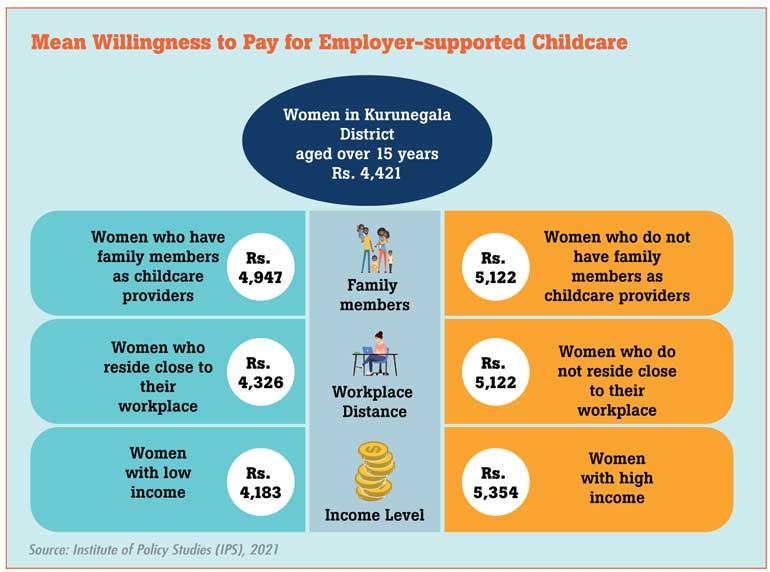Reply To:
Name - Reply Comment

 Kanthi is a 33-year old working mother who resides in Kuliyapitiya. Her two-year-old daughter is enrolled at a private crèche located eight km away from her home. Distance apart, Kanthi is not satisfied with the quality of the childcare and finds it expensive.
Kanthi is a 33-year old working mother who resides in Kuliyapitiya. Her two-year-old daughter is enrolled at a private crèche located eight km away from her home. Distance apart, Kanthi is not satisfied with the quality of the childcare and finds it expensive.
With no other choice, she drops off her toddler at the crèche every weekday with a heavy heart. Kanthi elaborated on some of her difficulties during a survey for an ongoing IPS study examining employer-supported childcare facilities for women in the Kurunegala district:
“Not every working mother has the luxury of having grandparents to look after their children. Most days, I find I am unable to fully concentrate at work due to anxiety around my child’s wellbeing. Having employer-supported childcare centres will ensure a child’s safety and peace of mind for parents.”
Kanthi’s story is the story of many Sri Lankan employed women who struggle to manage paid work, household chores and childcare duties – due to lack of adequate childcare support and entrenched socio-cultural gender roles.
Despite a growing need for childcare, for many women, finding quality and affordable childcare is difficult and childcare costs are very high.At the same time, faced with labour shortages employers are struggling to attract women to the workforce. Some companies have tried to overcome this problem by offering childcare at the workplace.
This article, based on the above-mentioned IPS study, tries to assess the feasibility of employer-assisted child care, by estimating the willingness of women to pay for such childcare.

Childcare as an impediment to women’s employment
Traditionally, care and domestic work are considered ‘women’s work’ and such care work has a direct and negative impact on women’s ability to participate in labour market activitiesleading to gender gaps in employment outcomes, wages and pensions.
The presence of children under five years in the household lowers the chances for Sri Lankan women to participate in the labour force. Having at least one child under five in the household makes women 7.4 percent less likely to join the labour force compared to women without young children, while
this has no significant association for men.
The need to provide affordable and quality childcare is recognised at the national level. The National Day Care Centre Policy (Draft) highlights the need for accessible day care services in the country and encourages women to takeup or return to employment through greater provision of day-care services. The National Policy on Early Childhood Care and Development (Draft) also flags the need for affordable and quality childcare.
Why employer-supported childcare is attractive
Most Sri Lankan families are struggling to meet the costs of childcare. A vast majority of women who wish to be employed do not enter the labour market due to the lack of quality and affordable childcare. Even low-income families have to bear the high cost of childcare due to the absence of affordable childcare arrangements.
Employer-supported childcare is an emerging choice available to working mothers in private sector companies which helps to reduce work-family conflicts and yields business benefits for employers.
Due to the lack of affordable childcare, women are attracted to employer-supported childcare as it helps them to concentrate on their work without worrying about their children. Accordingly, employer-supported childcare would encourage women to enter the labour market and enable working mothers to remain in the labour market.
Employee perspectives from IPS study
A new IPS study, based on a sample of 384 women from the Kurunegala district, finds that the mean willingness to pay for employer-supported childcare for women aged over 15 years is Rs. 4,421 per month.
Using maximum likelihood estimation, the study also found that a woman’s education, monthly income, employment status and childbearing age are positively associated with the woman’s willingness to pay for employer-supported childcare services. In addition, family-related expenses negatively correlate with the willingness to pay.
A family member as a childcare provider positively affects women’s employment. The mean willingness to pay of women who have family members as childcare providers is Rs. 4,947. However, it is Rs. 5,122 for women who do not have family members as childcare providers.
Further, women who reside close to their workplace are willing to pay Rs. 4,326 for employer-supported childcare. It is Rs. 796 higher for women who reside more than 1km away from their workplace.
In addition, low-income women (paid less than Rs. 30,000.00 per month) are willing to pay Rs. 4,183 per month for employer-supported childcare. It is Rs. 1,171 higher for women who are paid more than Rs. 30,000.00 per month.
Recent data shows that the cost of employer-assisted childcare is about Rs. 4,000 per child per month. The above analysis shows that women from different circumstances, including low-income women, are willing to pay more than Rs. 4,000 for employer-supported childcare. This suggests that employer-assisted childcare can be a solution to the labour shortages faced by firms, especially for employers with a large number of young mothers.
Even employers with a small number of mothers can come together to provide assisted childcare. Given that women are willing to pay more than the cost of providing childcare, employers need not bear additional financial costs to provide such care.
Way forward
Attracting more women to the labour market raises economic output levels and living standards. Moreover, better childcare supports not just women’s employment but also fosters children’s wellbeing.
Access to childcare, women’s employment, and economic growth go hand-in-hand with a country’s development. Support for employers to provide childcare services at workplaces can be a win-win scenario as it is a solution to affordable and quality child-care, labour-shortages as well as low-female labour force participation.
(Amanda Balasooriya is the winner of the Saman Kelegama Memorial Research Grant for 2020 offered by Institute of Policy Studies of Sri Lanka. Her research study examines on-site childcare facilities for women in the Kurunegala district and their willingness to pay for such establishments. Amanda is a B.Sc. (Special) Graduate in Industrial Management of the Faculty of Applied Sciences, Wayamba University of Sri Lanka)